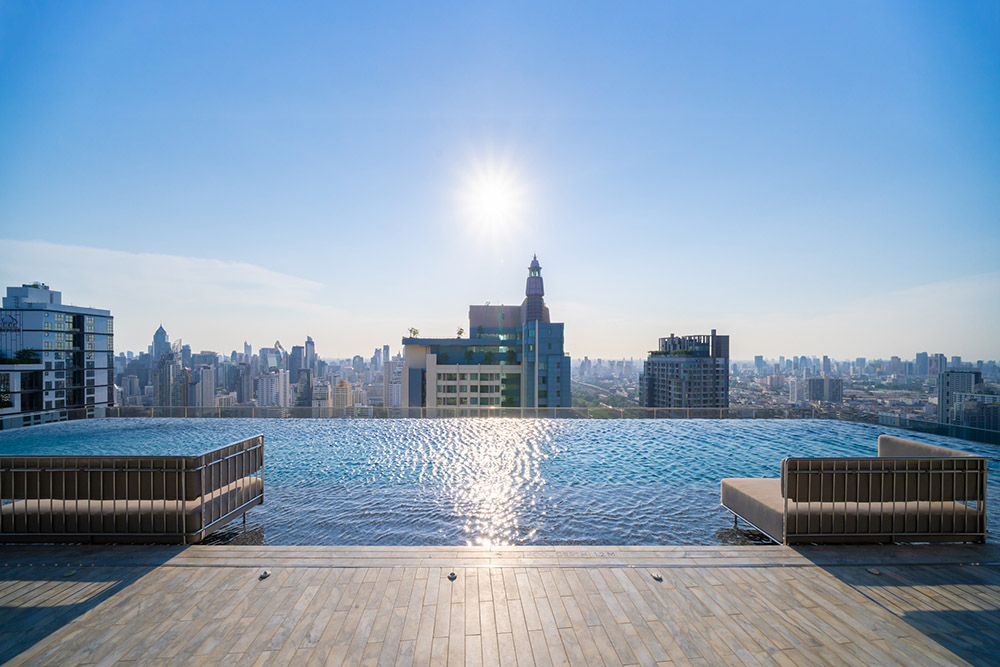Aspire Property wants to help you buy property in Thailand that achieves your real estate goals, whether it is to find the perfect family home or an ideal condominium investment. Here is our guide to buying property in Thailand.
Owning property in Thailand
While Thai citizens are generally not prohibited from owning most types of property in Thailand, foreigners do have restrictions placed on them by Thai law.
Can foreigners own land in Thailand?
As a foreign individual, Thai law prohibits you from directly owning land in most cases.
You do have the option to lease the land for 30-year stretches, which you can renew twice for a total of 90 years. Another option is, since foreigners cannot be direct land owners, to secure legal control over land ownership.
If a seller is claiming that you can own land directly as a foreigner, you should first consult a trusted real estate advisor, such as Aspire Property.
The team at Aspire Property are experts at helping foreigners obtain long-term leases or achieve ownership control over land legally and prudently and can advise you on navigating real estate transactions in Thailand.
Can foreigners own condominiums in Thailand?
Yes, although foreigners cannot own land, they can own condominium units in Thailand, under certain circumstances.
Freehold condominiums
Foreigners can fully own (100%) a condominium unit in a freehold condominium project, which is often the best option for foreigners seeking to own property in Thailand. However, under Thai law, a freehold condominium project can have no more than 49% foreign ownership at any time.
Thai nationals must own a majority 51%. So, before purchasing or even putting down a deposit for a condominium, it is essential that you confirm you will not be exceeding this quota. Otherwise, government authorities will not recognize your ownership.
Leasehold condominiums
Although not technically full ownership, leasehold condominiums allow for long-term residency much like ownership. This is because once you register a 30-year lease with the district’s Land Office, you are afforded certain rights. Separately, you can negotiate renewals with the underlying owner for an additional one, if not two, 30-year terms after the first expires.
Aspire Property has experience with both freehold and leasehold condominiums in Bangkok and Thailand, so you can trust us to help you find and negotiate the terms necessary for you to obtain the keys to your condo.
Paying for a condominium purchase in Thailand
In most cases, foreigners must use funds that have been transferred from abroad to purchase a condominium in Thailand. This transaction must have an accompanying Thor Tor Sam (TT3) form from the recipient bank in Thailand. And if the transfer amount is equivalent to over USD 50,000, you will also receive a Foreign Exchange Transaction Form from the Thai bank. You will need to present both documents to the Land Department to confirm your purchase and register your ownership of the condominium.
Steps to buying property in Thailand
After viewing a property and deciding you want to buy it, there are a few steps to achieving ownership, including:
- Negotiate a mutually agreed price including terms and conditions, such as deposit, transfer fee, ownership transfer date, etc.
- Aspire will send the first sales agreement sheet to both seller and buyer for signatures.
- Pay a booking fee so that the owner will not sell your ideal property to someone else!
- After receiving the booking fee, Aspire will proceed with a full sales contract.
- Pay the deposit.
- Pay agreed-upon price at the appointed date.
- Seller transfers ownership to you.
- Take ownership
Taxes and fees for buying property in Thailand
In addition to the purchase cost, there are fees and taxes that you must pay to complete the ownership transfer. Generally, these costs are split between buyer and seller, but you should make sure to have this settled in advance.
- Transfer fee of 2% on the property’s assessed value.
- Specific Business Tax (SBT) of 3.3% of the higher of the property’s assessed value or sales price. This applies to sellers that are businesses or individuals who have owned the property for less than five years.
- Stamp duty of 0.5% of the higher of the property’s assessed value or sales price. This applies only if SBT does not.
- Income tax of 1% of the higher of the property’s assessed value or sales price for businesses selling and, for individual sellers, based on their marginal tax rate.
Let Aspire Property find the ideal property for you
Aspire Property strives to find every client their ideal property. Our team dedicates themselves to understanding and anticipating client needs so that we can identify the right array of real estate for you to choose from. Aspire offers a full service so that you do not have to waste time browsing properties on different websites. You just tell us your needs and wishes, and Aspire goes to work to create a shortlist of properties for you to evaluate at your convenience. Then, from arranging and helping you through site visits to negotiation and then ownership transfer, you can rely on Aspire Property as your trustworthy agent, helping you every step of the way on your path to your ideal property.



